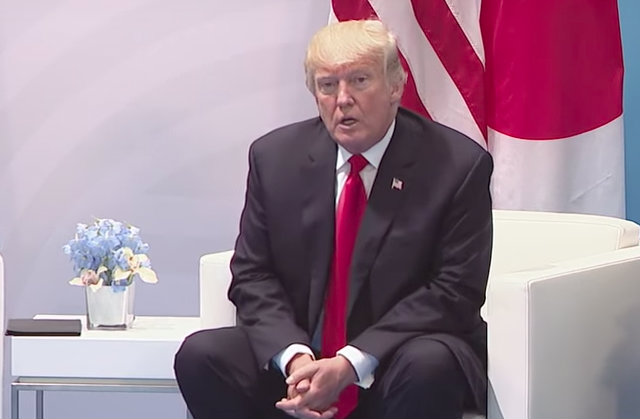 Grab your popcorn, because things are about to get really good. Trump’s recent lamenting that he “would have picked somebody else” as attorney general had he known Jeff Sessions planned to recuse himself from the Russia investigation was just the prelude to the pandemonium happening now.
Grab your popcorn, because things are about to get really good. Trump’s recent lamenting that he “would have picked somebody else” as attorney general had he known Jeff Sessions planned to recuse himself from the Russia investigation was just the prelude to the pandemonium happening now.
The White House is in full out panic mode over the FBI’s probe of the Trump campaign and potential ties to the Kremlin. Tonight, The Washington Post reported that Trump’s lawyers are exploring ways to “undercut” special counsel Robert S. Mueller’s investigation – apparently seeking to discredit Mueller over some alleged conflicts of interest.
And that’s still not the craziest thing going on over at 1600 Penn. According to the article, sources reported that:
“Trump has asked his advisers about his power to pardon aides, family members and even himself in connection with the probe, according to one of those people. A second person said Trump’s lawyers have been discussing the president’s pardoning powers among themselves.”
That’s right. Our president is checking into his options about pardoning himself. If what The Washington Post reported is accurate, it means that despite Trump’s incessant ranting about “witch hunts,” and “unfairness,” he has legit fears that Winter Is Coming.
But could President Trump actually pardon himself?
We at LawNewz.com have already looked into the question of whether a sitting president can pardon himself – although, full disclosure, we first delved into that analysis when the hypothetical related to President Hillary Clinton pardoning herself over Emailgate. My, how things have changed since last October.
Our analysis, though, still holds. POTUS 45 – be it Clinton or Trump — very likely has the power to issue a self-pardon. The president’s pardon power derives from Article II, Section 2 of the United States Constitution, which provides:
“The President … shall have Power to grant Reprieves and Pardons for Offenses against the United States, except in Cases of Impeachment.”
Under Article II, Section 2, the only limits placed on the power are that pardons may only be issued for federal offenses (not civil or state crimes), and a pardon cannot override the Congress’ impeachment power. In the case of Trump, any criminal wrongdoing stemming from the Russia probe would almost certainly be a federal offense, and we’re likely talking about criminal prosecution here – not impeachment. That is, of course, not to say that impeachment couldn’t also happen – but impeachment and prosecution are two entirely separate processes with separate remedies.
Here’s the tricky thing about pardons: they’re not always the final plot twists in a courtroom drama. Sometimes, people are pardoned before they’ve ever been charged with anything. And some pardons have been completely general, just like President Ford’s preemptive pardon of President Nixon for every federal offense Nixon had “committed or may have committed” while in office. A blanket absolution for all offenses that stymies a prosecution before it even happens? That’s got “Trump” written all over it. Ford’s pardon of Nixon wasn’t without it’s own controversy, as some legal scholars argued that its preemptive nature exceeded the bounds of Ford’s constitutional authority. Others raised the counterargument that that pardons are properly timed so long as they are issued after the commission of a crime – not necessarily after the proof at trial of that crime. Both arguments make some sense, and neither has been tested, so it’s tough to say what would happen if the issue were raised in court by the Trump administration or its opponents.
The idea of a self-pardon is definitely something new for Americans. No president has ever pardoned himself — not even Nixon, who knew a prosecution was looming. Because it’s never been attempted, the legal battles haven’t yet been waged. Most likely, a Trump self-pardon would spark a battle between those who believe it’s legal, simply because it’s not specifically forbidden in the Constitution – and those who believe it’s illegal, because it offends traditional legal sensibilities. After all, our legal system doesn’t, in any other circumstances, allow a person to preside over his own fate when he has been accused of a crime.
Rounding out a nice closed circle of the law, even if a self-pardon were adjudicated to be a legal way to save Trump from criminal prosecution, the bizarre use of such a self-serving tool could very well constitute the precise kind of abuse of power for which impeachment is the proper remedy. For now, we’ll have to wait and see if Trump attempts to pardon himself. Most likely, a pardon would be a last resort for Trump; for now, he’s still busy trying to thwart (and perhaps fire) special counsel Mueller. Either way, this administration keeps raising the bar on drama.
This is an opinion piece. The views expressed in this article are those of just the author.